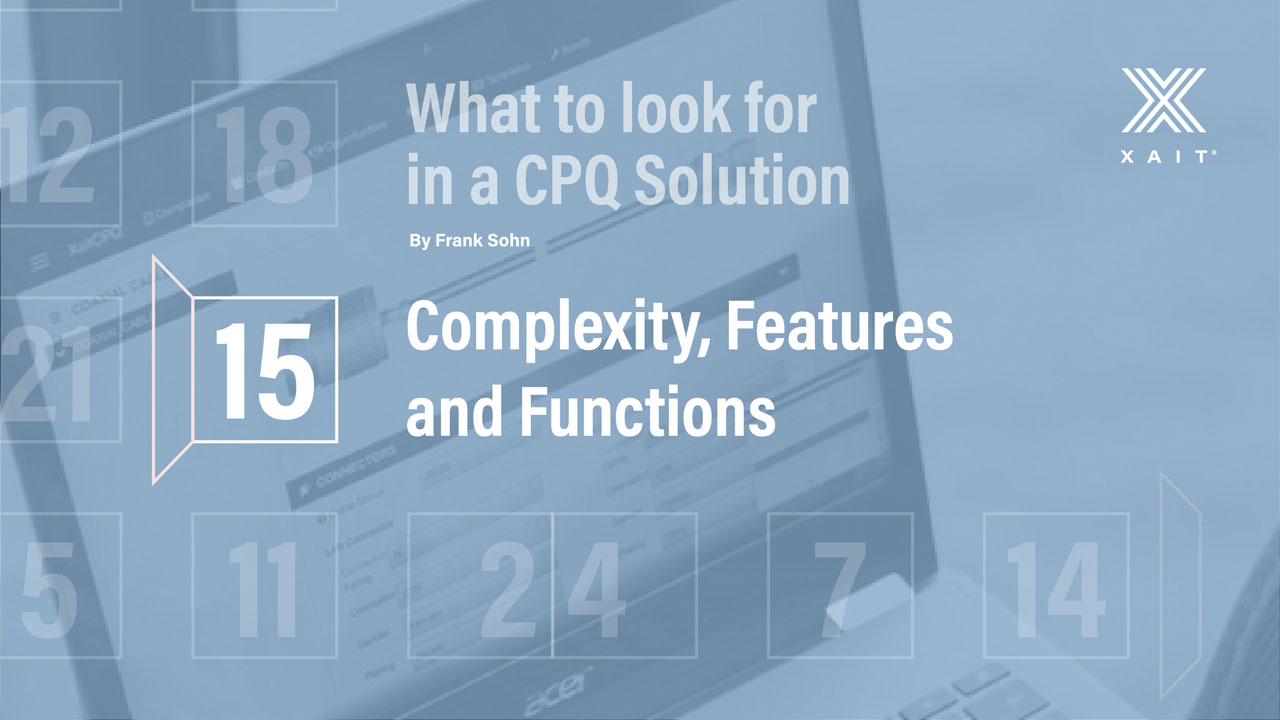
What to Look for in a CPQ Solution, Part 2: Complexity, Features and Functions
14.12.2022
-2 min

Software
LET'S TALK!
We offer software that makes you win big and ultimately gives you the work-life balance you deserve.

XaitPorter
Co-authoring and automation solution for complex documents

XaitCPQ
Quickly and accurately price combinations of interdependent products and services
XaitProposal
Guided proposal creation for comprehensive, winning proposals
XaitRFI
The smarter way to respond to RFIs, DDQs and security questionnaires
XaitWebProposal
The easiest way to create interactive and custom mini-websites

XaitAI
The X factor for analyzing and writing winning bids and proposals
Industry
OUR SOLUTIONS BY INDUSTRY
Do you have a question about your business vertical?
Resources
RESOURCES
Discover all our Xaiting resources!
About us
LET'S TALK
We can challenge mindsets and make significant changes to the way people interact

Frank Sohn
14.12.2022
-2 min

Do you know what to look for in a CPQ solution? Learn about the importance of the ability to handle complexity, and which features and functions to look for.
Customers have very different needs in regard to complexity of their products, prices and quotes. For example, it is different if a user wants to configure a car (the product), which has thousands of part numbers, or if they want to configure a table or a watch that has a handful of part numbers.
If the complexity of their products is high, they need a powerful configuration engine. This means, for example, that the configuration rules can be set up as formula-based rules (similar to Excel formulas) or as script or programming-based rules (think Java, etc.). Companies with simpler products require less powerful configuration engines.
Some customers have a high complexity regarding their product pricing. Meaning for example that every product price for every customer is different, and that every quote has 200 different products. There are CPQ solutions that are focused on the pricing capability, and they typically show this by saying they provide the ‘P’ in CPQ.
Other customers want to have "very attractive quote documents", for example, with a customized look and feel, product visuals, and 2D drawings. In this case, they focus on the ‘Q’ in CPQ.
Future CPQ customers should know what kind of complexity they require in each area (Product, Price & Quote) before they look for CPQ solutions in order to save time and budget.
A number of CPQ solutions are ‘all-in-one solutions’, meaning they do provide basic Customer Relationship Capabilities (CRM), CPQ, eSignature, Document Management including Contract Management, visualizations like 2D, 3D, Augmented Reality (AR) and Virtual Reality (VR) ,and potentially many other capabilities.
These solutions do not always provide a best-in-class experience in each area, but they require fewer integrations to third-party software tools, which is important to some customers.
Other CPQ solutions are "specialized solutions", meaning they really focus on the core CPQ capabilities and partner with other software vendors for specific capabilities as needed. For example, they do not develop their own eSignature tool or CRM capabilities but develop partnerships with third-party software vendors as needed.
Future CPQ customers should decide what is important for their business now and in the (near) future. Do they value more an ‘all-in-one package’, or do they need best-in-class solutions for each area?
Next in our series on what to look for in a CPQ solution: Learn about some of the basic integration requirements for a CPQ solution, in addition to more advanced ones that your organization might require.

Frank Sohn
Originally from Germany, Frank started his CPQ experience with a SAP Project focused on Variant Configuration in Germany in 1996. He started his career as a developer in 1993 and then became an SAP Consultant in 1994. After spending a few years with small SAP consulting firms in Germany, Switzerland and the UK, he worked for multiple global high tech companies such as IBM GS, Hewlett Packard, IBM, Juniper and PWC prior to following his passion and founding his own CPQ focused consulting company. Throughout his career Frank was passionate about the customization and personalization the configuration, price, quote tools enable, and wants to help his clients to get the most value out of the CPQ processes and tools. Frank received a Bachelor of Business Information Technology degree in Germany in 1992. He is also a PMP (Project Management Professional since 2005) and a CSM (Certified SCRUM Master, since 2010).

